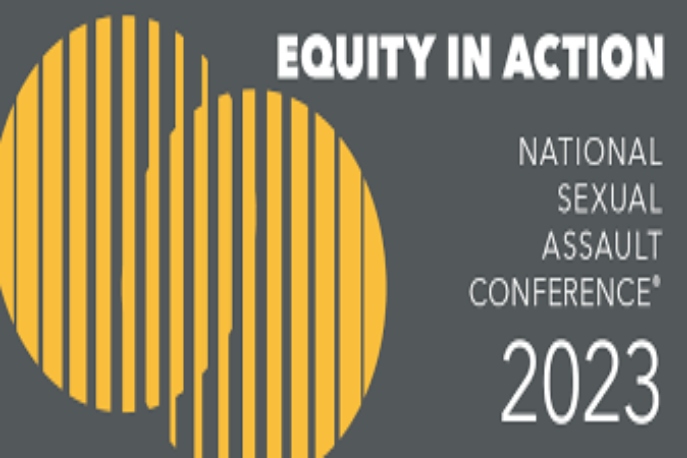The 2023 National Sexual Assault Conference is about to kick off, and we caught up with some of RALIANCE’s experts who will be on the ground. Below are some key highlights from Project Manager Tori VandeLinde, Project Coordinator Julia Mallory, and Corporate Research Associate Megan Owens. They share some insights on what to expect and what they’re most looking forward to at this year’s conference.
The 2023 National Sexual Assault Conference is just around the corner – what are members of the RALIANCE team most looking forward to?
Julia: As a new member of the team, I am looking forward to connecting with people all over the country that are making such valuable contributions in the fight to end sexual violence. I also look forward to meeting past and current RALIANCE grantees.
Megan: I’m looking forward to connecting with the whole team in person again and getting the chance to meet some of our partner organizations that will also be in attendance. Additionally, I’m excited to help out with some of our RALIANCE track sessions, introduce our work to folks from across the country, and build partnerships with more organizations.
Tori: I’m looking forward to attending the National Sexual Assault Conference in-person again. The last in-person NSAC was in 2019, and the landscape of our world and our work has changed so much since then. NSAC usually brings so much excitement and ignites important conversations about the future of our movement, and how we can make improvements to our services to survivors, communities, and advancing equity.
What role is RALIANCE as an organization playing in this year’s NSAC programming?
Megan: There is a RALIANCE track this year! Attendees have the opportunity to directly plug into what RALIANCE is doing and get an up-close work of what we have been up to since the last NSAC.
Tori: We’re so excited for the RALIANCE track this year! In addition to a few RALIANCE Impact Grantees presenting on the RALIANCE track, I’m also looking forward to sessions lead by RALIANCE staff and partners of RALIANCE. These sessions include conversations about ending forced arbitration with Disrupt the Landing, how to drive change for safety with Uber, and thinking beyond all-or-nothing responses to harm led by our RALIANCE leadership team.
The theme of this year’s conference is “Equity in Action”. What does this mean to you, and why is it relevant to where we are in the fight against sexual violence in 2023?
Julia: Equity in Action demonstrates to me the necessary work of recognizing and providing the necessary resources to honor the complex experiences of survivors. Equity in Action marks a pivotal shift and growth in advocacy.
Megan: The theme really points out the necessity for our work in this movement to be action oriented. Discussions around equity are vital, but without action, there isn’t much substance behind those discussions. Over the past few years, we’ve seen an increase in attacks against marginalized communities, including the LGBTQ+ community and people of color, and issues that affect survivors, like access to reproductive care. These are all things that directly affect survivors, and without addressing sexual violence through a lens of equity we won’t be able to accomplish our goals of ending sexual violence and supporting all survivors and advocates.
Tori: I co-sign everything Julia and Megan said about the importance and relevance of Equity in Action being the theme of NSAC 2023. Over the last few years especially, we’ve seen individual’s commitment to advancing equity ebb and flow, and we know that in order to change cultures, we need sustained efforts over time. I’m hoping that by being emersed in NSAC, attendees will learn what actions they can take back to their communities to commit to the journey of culture change to advance equity. The goal of NSAC is never to be a one-time conversation or learning opportunity, but instead to serve as activation beyond the week of NSAC. This will require us all to expand beyond our comfort zones and commit to following the leadership of those we interact with at NSAC who are most impacted by violence and systemic marginalization.
What advice do you have for first time attendees of NSAC?
Megan: This will be my first NSAC, so I can’t really give advice for first-timers! However, as a first-timer, I plan to try to take advantage of the in-person gathering and connect with as many folks from the movement as possible.
Tori: In a way, this will be a “first NSAC” for a lot of folks: first NSAC ever, first in-person NSAC, and—for everyone—the first in-person NSAC since the start of the COVID-19 pandemic. My advice to everyone is to be present. With 112 sessions, inspiring plenaries, and after-hours events like a film screening, a historic walking tour, and a listening session, there’s a lot to do in just a few short days! Do what you can to stay present, absorb everything NSAC has to offer, and bring that back to your local communities. For me, that means keeping a notebook and pen with me during sessions, making the most of my time in-person with people I don’t get to see often, and giving time to myself at the end of each day to download and decompress. For more advice on making the most out of NSAC, check out this blog from PreventConnect, “15 tips for your best NSAC ever.”
RALIANCE is a trusted adviser for organizations committed to building cultures that are safe, equitable, and respectful. RALIANCE offers unparalleled expertise in serving survivors of sexual harassment, misconduct, and abuse which drives our mission to help organizations across sectors create inclusive environments for all. For more information, please visit www.RALIANCE.org.

